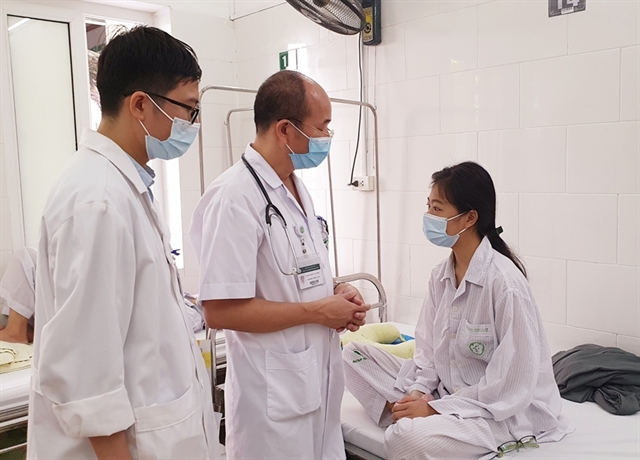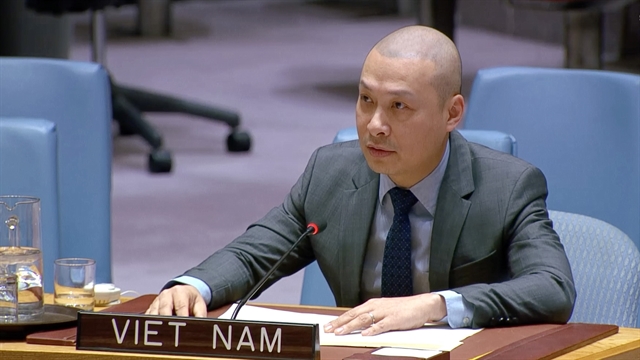 Society
Society


|
| A malaria patient is treated in Bạch Mai Hospital's Centre for Tropical Diseases.— Photo suckhoedoisong.vn |
HÀ NỘI — Doctors at Hà Nội's Bạch Mai Hospital have warned of the risk of malaria from Africa as the hospital's Centre for Tropical Diseases is treating two malaria patients who returned from Angola recently.
For many years, Hà Nội and the northern provinces have had almost no malaria patients, so the timely detection, diagnosis and treatment of malaria cases returning from abroad in grass-roots health facilities is difficult and easily missed.
Patient Nguyễn Đình Th., 38, from the central province of Hà Tĩnh, returned home from Angola one week ago.
Before, he worked and lived in Angola for 12 years. Five days before being hospitalised, he got a high fever, shivers and severe headaches. The fevers mainly occurred in the afternoon twice a day, accompanied by painful urination and loose stools.
The patient went to a medical facility near his home, but doctors did not find any disease, so he went to the Hà Tĩnh General Hospital in severe condition and was transferred to the Centre for Tropical Diseases.
After exploiting the epidemiological factors by doing blood tests, the doctors discovered Plasmodium falciparum's malaria parasite in his blood.
The second patient is a 6-month pregnant woman in Hà Nội. She worked in Angola for eight years and just came back to Hà Nội one week ago.
Three days before the hospital admission, she had a high fever and severe chills, mainly in the evening.
After the fever, she sweated a lot, accompanied by vomiting, nausea and headaches.
She went to a private clinic, was admitted to the National Institute of Malaria, Parasitology and Entomology for testing and was diagnosed with malaria.
Due to her pregnancy and low platelet disease, she was transferred to the Centre for Tropical Diseases, where she was closely monitored.
According to Associated Professor Đỗ Duy Cường, the centre's director, both patients developed fever right after returning to Việt Nam, but the healthcare facilities at the grass-roots level did not pay attention to the epidemiological factor that they had been in Africa, so they did not detect the disease.
Due to the rampant atypical malaria symptoms, it was easy to confuse with other diseases such as flu, COVID-19, dengue fever, or urinary infection, Cường said.
Cường added: "In recent years, malaria in Việt Nam had been controlled quite successfully because we had effective malaria control programmes in localities and adequate malarial medicines, so the rates of infection and mortality from the disease had decreased significantly."
"The disease has now occurred only in a few provinces in Tây Nguyên (the Central Highlands) and southern provinces."
However, the centre recently received many malaria patients from Africa, so it is called "imported" malaria.
The doctor said the reason was due to a lot of travel and the restoration of flights for Vietnamese people returning home from Africa, especially from Angola, after a period of COVID-19.
There have been many warnings about malaria cases returning from Africa in recent years, especially in those who returned from Angola.
Therefore, these people must declare epidemiological factors, monitor health and get tested because malaria can become severe and life-threatening.
"We had seen many cases of malaria becoming acute malaria with the symptom of persistent high fever, which can cause patients to enter into a coma for three to five days, which is life-threatening," the doctor said.
"When falling into a coma, patients can get multi-organ failure of the liver, kidneys and lungs, or anaemia, convulsions and hypoglycemia," he said.
"However, if treated promptly, the organ functions will gradually recover with the right medicines."
Currently, the malaria medicines of Artesunate and Arterakin are provided under the malaria prevention and control programme by the Ministry of Health. VNS
Malaria situation in HCM City HCM City’s Hospital for Tropical Diseases last week reported that the unit has received and treated two imported cases of severe malaria. These are the first cases of malaria recorded in the city in recent years. One of the two patients is a 24-year-old Vietnamese student who returned from Cameroon. The other is a 63-year-old Chinese man, who travelled to the city from Ivory Coast. According to doctor Hồ Đặng Trung Nghĩa, head of the hospital’s Department of Infectious Diseases, both patients came from Africa where malaria is still endemic. Nghĩa recommends that people who return from malaria-endemic areas such as Laos, Cambodia, and Africa or those who have had malaria before, need to go to medical facilities for examination and testing if they have a fever. — VNS |




